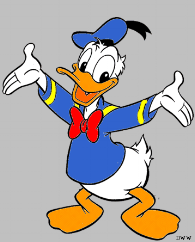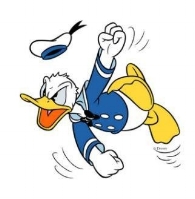The ZALT Bubble
With Zandy.
This is about Donald… but not “That Donald”!
My conflict resolution career started when watching cartoons as a child. Donald Duck taught me to try to understand by searching to see what is driving behaviour. If you miss those drivers you miss the opportunity to resolve issues.
I loved Donald Duck growing up. Everyone else was singing M-I-C-K-E-Y…blah blah blah. And I’d indignantly say “Donald Duck is much better”. I would passionately defend his temper tantrums saying “but Chip and Dale stole his food he didn’t mean to yell at you Daisy. Please don’t be angry with him”. Or “Goofey was annoying him. He exploded in rage because of what Goofey did”. Look what happened when someone teased him about having small hands https://www.youtube.com/watch?v=x39-AgyU3Xg.
Alright. I may have been over thinking things and yes, now as an adult, I can see that Donald needed to take responsibility for his actions regardless of provocation. But I still love Donald Duck. And I still think he is just a little misunderstood.

I carry this “he’s being misunderstood” outlook into my conflict resolution world and utilise it to both diagnose what’s really going on underneath a “temper tantrum” and to engage parties to see beyond the behaviour. This perspective of being able to see through someone’s behaviour to truly understand what is driving their behaviour is one of our key conflict resolution principles. It is what allows us to address root cause issues and help to improve the situation, and more often than not, change behaviours and relationships.
Chris Argyis’s ladder of Inference (most popularly introduced by Peter Senge in his book, The Fifth Discipline) is a metaphor that illustrates how the human brain progresses through a series of steps to arrive at actions or behaviours based on experiences and assumptions. There is so much written on this model but this is a short video http://ed.ted.com/lessons/rethinking-thinking-trevor-maber
Just this week I was conflict coaching an Executive who works for a Victorian Government Department. He was keen to discipline a manager for her unprofessional behaviour where she loudly voiced her negative opinion of him in the reception area where members of the public were present. I engaged him to identify what had caused this behaviour. He identified a number of things including his lack of prioritisation of her in recent months. He acknowledged his contribution to the dynamic at hand. She may still be disciplined but the insight into why this has happened will change his approach and I am anticipating a significantly improved relationship.
If we only see someone’s behaviour and only address behaviour we miss the opportunity. We miss the opportunity to resolve what is causing “Donald Duck” to act that way.

So, please, make the choice to understand the Donald Duck in your workplace. And if you want to discuss him or her further please be in touch. This blog is dedicated to my Dad as he and I share our love for Donald Duck and conflict resolution. Thanks for this and so so much more Dad.
LAST CHANCE TO REGISTER FOR OUR UPCOMING HR WORKSHOPS:
Facilitating Difficult Conversations In The Workplace – 26 & 27 July 2017.
Workplace Investigations Training – 7 August 2017.
If you enjoyed this blog you may also be interested in:
Conflict Magic
I hear you but I’m not listening
Conflict Resolution is just a fancy word for problem solving –
http://us5.campaign-archive1.com/?u=72d40ccb4ab25b8f3b87d8f8a&id=0ec800e0c5



